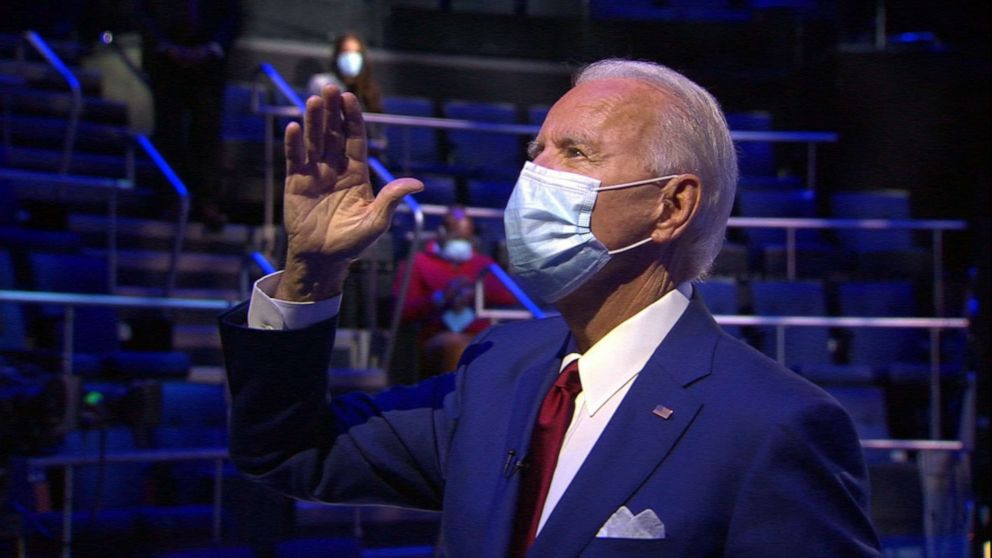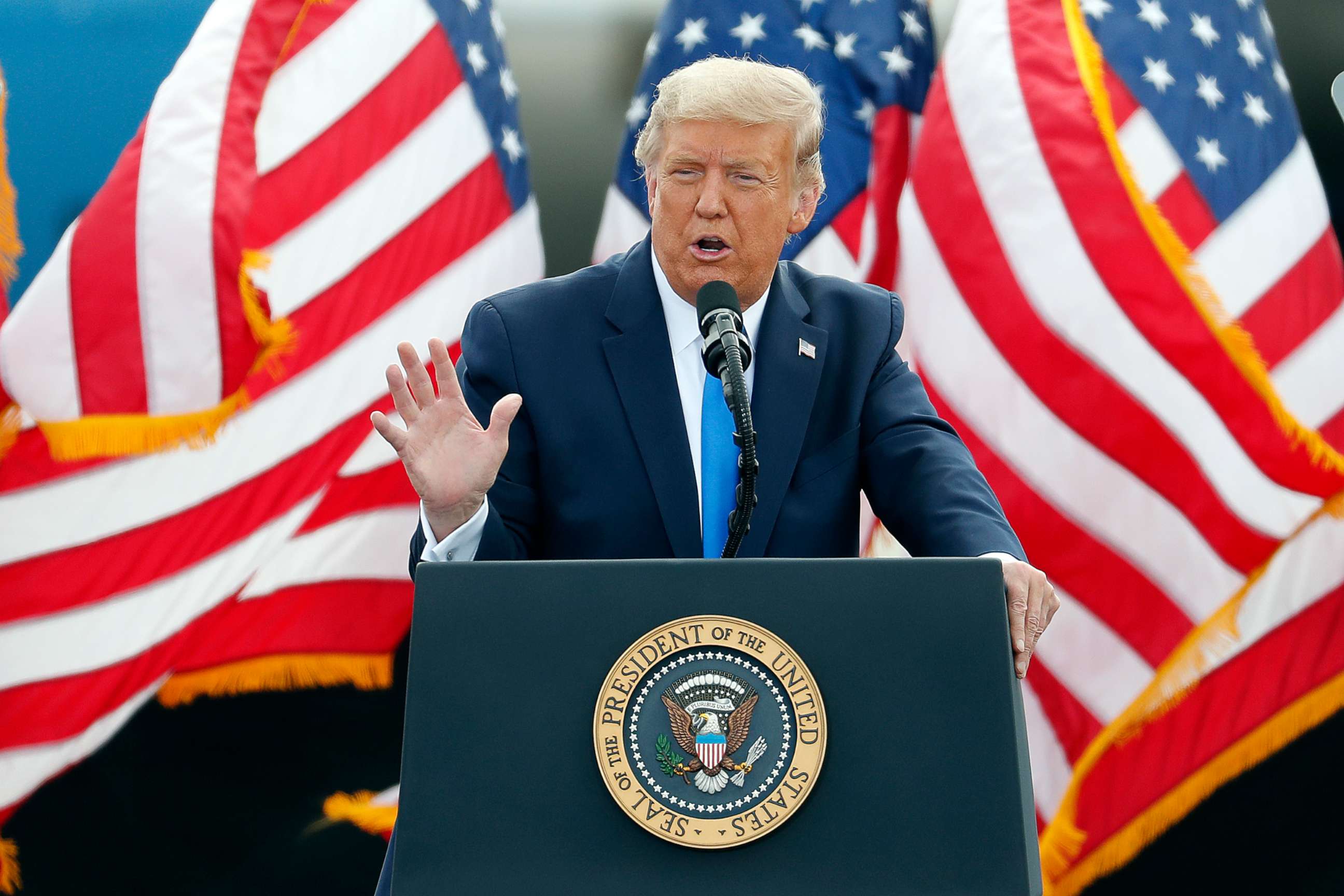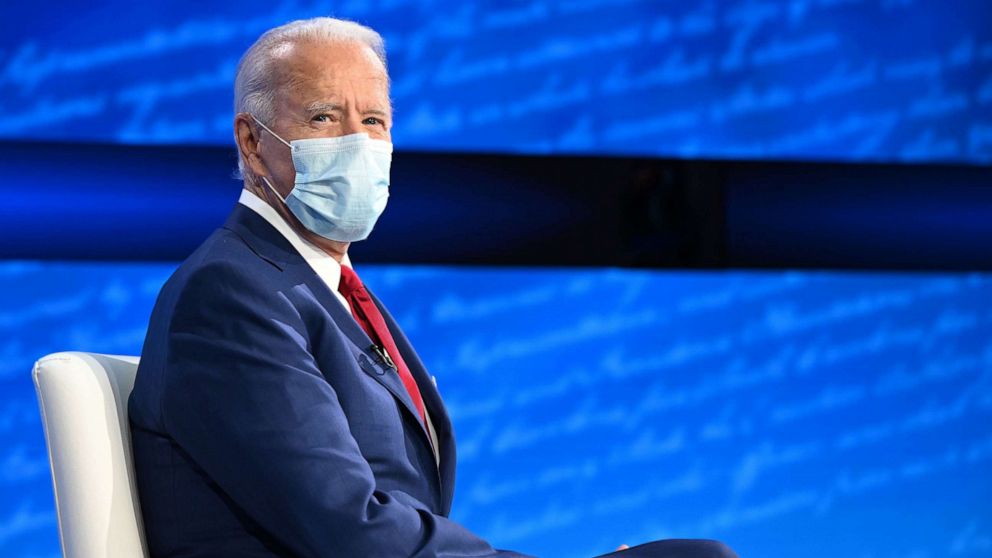5 key takeaways from Joe Biden's town hall with ABC News
Instead of facing voters alongside President Donald Trump, former Vice President Joe Biden had the opportunity to make his case without his challenger on stage with him, participating in an ABC News town hall with Pennsylvania voters at the National Constitution Center in Philadelphia.
During Thursday night's exclusive event, moderated by chief anchor George Stephanopoulos, Biden contrasted what his administration would look like compared to the current one with policy-heavy answers, pitching himself as the leader that he believes Trump hasn't been while in office, and throughout the ongoing coronavirus pandemic.
The presidential candidates were supposed to participate in the second debate Thursday, but after the Commission on Presidential Debates opted to make the town hall-style night a virtual event as a safety precaution following Trump's positive COVID-19 diagnosis, the president said he would no longer participate, and the debate was ultimately canceled.
With less than three weeks until Nov. 3, time is running out for the candidates to push voters into their camp. Already, more than 18 million voters have cast their ballots, and while that's an unprecedented turnout this far out from Election Day, many more Americans have yet to officially make their voices heard.
Here are the key takeaways from Biden's ABC News town hall:
When pressed, Biden said he will give voters his "clear position" on court packing before Election Day
Biden, who has repeatedly dodged giving a clear answer on court packing, told Stephanopoulos he would give voters an answer before Election Day, despite the fact that millions of voters have already cast their ballots.
"George, you know if I had answered the question directly, then all the focus would be on what's Biden going to do if he wins instead of on: Is it appropriate what is going on now?" Biden said, adding the president loves to "take our eye off the ball."

Biden said he hasn't always been a fan of packing the court, but now, depending on how the Senate handles Trump's nomination of Judge Amy Coney Barrett, he may change his mind.
"It depends on how much they rush this," Biden said. "And you think about it, George, here you got a lot of people not being able to pay their mortgage, not being able to put food on the table, not being able to keep their business open, not being able to do anything to deal with what's going on in terms of the economy as a consequence of COVID, and they have no time to deal with that, but they have time to rush this through."
Stephanopoulos pushed back on Biden, asking, "But don't voters have a right to know where you stand?"
Biden said they do, Stephanopoulos followed up asking, "So you'll come out with a clear position before Election Day?"
"Yes," Biden said, but then quickly followed with a caveat. "Depending on how they handled this."
That caveat could be notable as just a week ago, Biden gave a different timeline on when voters would know his stance, telling reporters, "They’ll know my opinion on court-packing when the election is over."
While Trump pushes for a coming vaccine, Biden goes all in on masks
While Trump has continually pushed forward on the availability of a coronavirus vaccine before the end of the year, and consistently flouted wearing a mask, Biden expressed concern about the accuracy of Trump's vaccine comments.
"No. 1: President Trump talks about things that just aren't accurate about everything," Biden said. "The point is that if the scientists, if the body of scientists, say if this is what is ready to be done, been tested, gone through the three phases, yes, I'd take it, encourage people to take it. President Trump says things like everything from crazy stuff he's walking away from now, 'Inject bleach in your arm and that's going to work.'"
Kelly Leigh, an undecided voter, asked Biden if he would take the vaccine coming out of the Trump administration -- and if he would mandate its use.
"I meet with four leading scientists... giving us the detail on what kind of progress is being made," he said. "They're not there yet. And most scientists say it's not likely to have a vaccine that will be available until the beginning of next year."
Stephanopoulos pressed Biden on if he would mandate the use of the vaccine.
"And once we get it, if it's safe, if it's effective, will you mandate its use?" he asked.
Biden noted that he couldn't mandate a vaccine, but he could go to state and local leaders to encourage mask mandates to slow the spread of the virus.
"But you can say... you can go to every governor and get them all in a room, all 50 of them, as president, and say, 'Ask people to wear the mask.' Everybody knows," Biden said, referring to their effectiveness.
And if governors were to deny Biden's request, he'd take it to other local leaders.
"I'd go to every mayor. I'd go to every councilman, I'd go to every local official, say, 'Mandate the mask,'" he said, adding that the words of a president matter.
"No matter whether they're good, bad, or indifferent, they matter," he said. "And when the president doesn't wear a mask or makes fun of folks like me when I was wearing a mask for a long time, then, you know, people say, 'Well, it must not be that important.'"
Biden leans heavily into policy as he pitches himself to voters
Throughout the debate, the former vice president repeatedly played up policy as he pitched himself to voters.
Cedric Humphrey, a young Black man, asked Biden, "What do you have to say to young Black voters who see voting for you as further participation in a system that continually fails to protect them?"
Biden first told Humphrey that young Black men and women have the power to decide this election, but then he pivoted to a deep dive in policy. He said that in addition to criminal justice reform, he wants to put Black Americans "in a position to be able to gain wealth."
He said he could do that by increasing funding for schools to ensure teachers don't leave them, and also allocating $70 billion to historically Black colleges and universities because "they don't have the kind of foundational support they need."
Throughout the summer, protesters took to the streets demanding justice for the Black men and women killed by police, and later during the town hall, Biden took on police reform, saying he would convene a "national study group" of police officers, social workers and Black and Brown Americans to come up with reforms together.
But he also laid out more concrete ideas, saying that he would arm police departments with new tools, without diminishing the police force.
"Cops are kind of like schoolteachers now. You know, a schoolteacher has to know everything from what, how to handle hunger in a household, as well as how to teach how to read," Biden said. "Well, cops don't have that breadth."
He said the solution isn't "defunding the police," which liberal activists and some elected Democrats have called for, but rather arming police with new weapons to respond in moments of crisis. Those weapons, however, are people -- psychologists and socials workers who can help better respond to situations that cops may not be equipped to handle, like when someone is under mental distress.
Asked by Stephanopoulos if he still believes that "more cops clearly mean less crime," Biden said he did, but the type of policing matters.
"If they're involved in community policing, not jump squads. For example, when we had community policing from the mid '90s on until -- until Bush got elected, what happened? Violent crime actually went down precipitously," Biden said. "Community policing doesn't mean more people coming in up armored humvees and swarming."
The former vice president also took the issue of on climate change, insisting that banning fracking -- a key industry in Pennsylvania -- is not something he's proposed, despite the president repeatedly claiming that he would.
Biden said the country needs to invest in renewable energy, but instead of just making it an environment pitch, he tailored it to the economy, saying it's "the fastest-growing employer in the energy industry." Getting into specifics, he said that 128,000 people could be hired to fill oil wells, "and get a good salary doing it."
Biden reiterates his unity pitch
Biden has centered much of his campaign around unifying the country and reiterated that pitch to voters Thursday. On the campaign trail, he often references the violence that unfolded after right-wing groups protested in Charlottesville in 2018, and the president's response that there were "good people on both sides."
Asked by Stephanopoulos what Biden thinks it would say about the state of the country if he didn't win this election, Biden said, "Well, it could say that I'm a lousy candidate and I didn't do a good job."
But what he hoped a Biden loss wouldn't say was "that we are as racially, ethically, and religiously at odds with one other as it appears the president wants us to be."
The former vice president said Trump's strategy is to "divide and conquer," but he, on the other hand, thinks people need hope.
"The way he does better is if he splits us, there's division. And I think people need hope. I think, look, George, I've never been more optimistic about the prospects for this country than I am today. And I really mean that. I think the people are ready. They understand what's at stake. And it's not about Democrat and Republican. If I get elected, you know, I'm going to be -- I'm running as a proud Democrat, but I'm going to be the American president," he said, adding he would also take care of those who voted against him.
"I'm going to take care of those who voted against me as well as those who voted for me. For real. That's what presidents do. We've got to heal this nation," Biden said

Biden said every American deserves to be treated with dignity, and without that, the country will be unable to meet its potential.
"My dad used to have an expression, for real. He said, 'Everyone's entitled to be treated with dignity. Everybody.' And it was real," Biden said. "Everybody is. And so, whether I'm a defeated candidate for president back teaching or I'm elected president, it is a major element of everything that I'm about. Because it reflects who we are as a nation."
"We're a diverse country. Unless we are able to treat people equally, we're just never going to meet our potential," he added.
Biden said Americans are ready to move past the division, which he said has overtaken so much of the nation. National polling does find that the majority of voters tend to opt with the vice president when it comes to the question of creating unity.
"I think they're ready to see it happen. And I'll tell you one thing, if I'm elected president, you will not hear me race baiting, you will not hear me dividing, you will hear me trying to unify," he said. "When I said I was running because I wanted to unify the country, people said, 'Well, they were the old days.' We better be able to do it again. We better be able to do it again."
Biden makes being coronavirus-conscious a matter of 'decency' when looking forward to next debate
The second presidential debate was cancelled after Trump tested positive for COVID-19, but Biden said he expects to be at the next one, which is still scheduled for Oct. 22, and that he wants the president to take a test that day.
For the first debate, candidates were expected to abide by an "honor system," and it was not clear how long before the debate Trump had been tested for the virus. During the president's own town hall on another network Thursday night, that lack of clarity persisted, with Trump, after being asked multiple times whether he was tested the day of the debate, saying he "probably did."
Stephanopoulos asked Biden to respond to that, and if he would "demand that President Trump take a test that day and that it be negative before you debate."
Biden said he would, and then made the case that doing so is a matter of respect.
"Before I came up here, I took another test. I've been taking them every day... if I had not passed that test, I didn't want to come here and not, you know, expose anybody. And I just think it's -- it's just decency," Biden said, making it clear that it's not about him, but rather about everyone else.
"I'm less concerned about me than the people, the guys with the cameras, the people working in the, you know, the Secret Service guys you drive up with, all those people," he said.
Biden's persistent message of concern for others, which he follows up with action, is a stark contrast to the actions of the current president.
Before and since his diagnosis, Trump has held largely maskless rallies with little social distancing, which health officials have pointed to as the types of events where transmission is more likely. While the president was at Walter Reed Medical Center being treated for coronavirus, he left the premises to go for a ride greeting supporters, and critics blasted him potentially putting his staff -- the Secret Service -- in danger of also being infected.
Meanwhile, Sen. Kamala Harris, Biden's running mate, cancelled her trip to North Carolina Thursday, making her scheduled events virtual instead, after her communications director tested positive for the virus.
This report was featured in the Friday, Oct. 16, 2020, episode of “Start Here,” ABC News’ daily news podcast.
"Start Here" offers a straightforward look at the day's top stories in 20 minutes. Listen for free every weekday on Apple Podcasts, Google Podcasts, Spotify, the ABC News app or wherever you get your podcasts.




